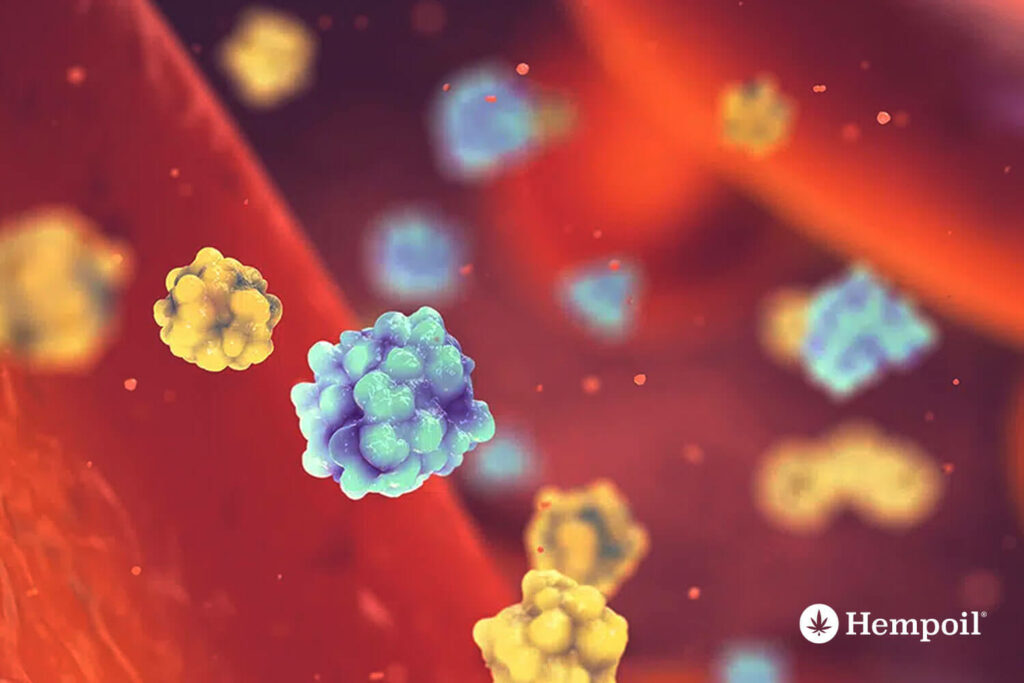Cannabidiol & Glucose: Metabolism, Effects, PPARs
Cannabinoid receptors CB1 and CB2 are the most famous endogenous receptors of the endocannabinoid system, but not the only ones. There are various phytocannabinoids, such as cannabidiol CBD, and two fatty acids neurotransmitters, known as endocannabinoids ( anandamide and 2- Arachidonoylglycerol/2-AG), that «interact» with the peroxisome proliferator-activated receptors (PPARs), which are the receptors detected on the surface of the cell’s nucleus.
Probably this is the reason why cannabidiol does not bind directly to the cannabinoid receptors CB1 and CB2. Below we will examine how cannabidiol can boost glucose metabolism via the nuclear receptors PPARs, thanks to anti-inflammatory, anti-convulsant, and neuroprotective effects. Up to date, we know that cannabidiol interacts with the nuclear receptor PPARγ and the receptor TRPV1 enhancing glucose metabolism. They are two receptors with a crucial role in balanced metabolism function, while their activation can lead to better levels of glucose intake, use, and storage in the body.
What are peroxisome proliferator activated receptors (PPARs)?
Peroxisome proliferator-activated receptors (PPARs) are nuclear receptors that are essential in processes including metabolism regulation, immune response, and gene expression. These receptors are present in different body parts activated by hormones, endocannabinoids, nutrients, or fatty acid compounds.
PPARα receptor is detected in the liver, kidneys, heart, musculoskeletal system, adipose tissue (body fat), skin, and brain cells. PPARβ/δ receptor is expressed in the heart, liver, adipose tissue, skin, brain cells, and the musculoskeletal system. PPARγ receptor is found in two forms expressed almost all over the body, including the colon, the cardiovascular and immune system.
The first evidence of the interaction between the endocannabinoid system and nuclear receptors PPARs, published in 2002 by the research team of the scientific journal Arteriosclerosis, Thrombosis and Vascular Biology, emphasizes the activation of PPARα receptor by the neurotransmitter 2-AG. Ever since more studies have been conducted presenting the peroxisome proliferator-activated receptors PPARs as an extension of the endocannabinoid system.
Recent studies are mentioning the importance of the nuclear receptors PPARs analysis and understanding, crucial for the glucose and lipid regulation, to get to know phytocannabinoids, such as cannabidiol CBD, and the endocannabinoid system.
CBD Cannabidiol, Psychosis and Glucose Metabolism
A research paper published in March 2023 in the journal Frontiers in Psychiatry, states that cannabidiol interacts with a nuclear receptor PPAR boosting glucose metabolism in the brain. When an organism has alterations leading to glucose metabolism shifts, then the body probably will have metabolic and cognitive disorders.
The paper describes the case of a 19-year-old man from Germany, who presented at the Cologne Early Recognition and Intervention Center, diagnosed with cognitive decline, anhedonia, ambivalence, social withdrawal, poverty of speech, and brief psychotic symptoms, particularly delusions and hallucinations. According to the research paper, the man, who participated in the survey, had no prior medical prescription, or any other treatment due to psychological disorders, nor has a family history of other psychiatric and neurological conditions. The physicians in charge decided to prescribe CBD, as it has beneficial properties in the endocannabinoid system combined with therapeutic effects in psychosis. The results after the conclusion of the study were surprising.
The participant received 600mg of pure cannabidiol CBD orally for 30 days. The data were encouraging, as the researchers observed improvement in focus, memory, and visuomotor speed without side effects or other adverse events. This is only one case, although it can be added to the collected data about the potential cannabidiol function mechanisms.

Mechanisms of action of CBD cannabidiol
Using brain scans and blood draws, the researchers mentioned a reduction in clinical symptoms accompanied by an increase of cerebral glucose utilization, which is a significant metabolic process. If this process impairs, then what follows, implicates diseases such as Alzheimer’s disease, obesity, diabetes, schizophrenia, and several other illnesses and disorders.
Researchers suggest that the mechanism linked to cannabidiol, cerebral glucose utilisation, and psychiatric symptoms may be the mechanism of the nuclear receptor PPARγ, one of the most famous receptors. PPARγ receptor plays a critical role in the homeostasis regulation of glucose and neuroinflammation, while it gets activated directly from Cannabidiol CBD and the neurotransmitter anandamide (AEA). It is not the first time that cannabidiol is linked with cerebral glucose metabolism, psychiatric symptoms, and PPARγ receptor. Previous studies underline the association between cannabidiol’s effectiveness to treat psychosis and the ability to boost anandamide which binds with the receptor PPARγ. This receptor has been recognized as a potential target for the cure of various psychiatric disorders. Another study conducted in 2022 on rats with Alzheimer’s disease, mentioned that the therapy with cannabidiol CBD contributed to the improvement of glucose metabolism, counting, also, the memory process. The scientists concluded that the direct or indirect activation of the PPARγ from cannabidiol seems to have promising antipsychotic effects, although more studies are required.
Cannabidiol and nuclear receptors
A review article, published in the journal Phytomedicine, in March 2023, refers to the affinity of CBD for nuclear receptor PPARγ. The research paper with the captivating title «Cannabidiol goes nuclear. The role of PPARγ», summarizes the existing research studies presenting how Cannabidiol and receptor PPARγ interactions influence human’s health. The review is based on 78 previous papers underlining cannabidiol’s effects on a long list of conditions, including Alzheimer’s disease, cancer, multiple sclerosis, depression, Parkinson’s disease, memory loss, cardiovascular, and immune disorders.
The receptor PPARγ regulates glucose homeostasis, and changes gene expression related to insulin secretion, lipid metabolism, inflammation, and immunity. Furthermore, they notice that many cannabidiol CBD effects can be prevented by synthetic PPARγ antagonists, already utilized as research tools.
To conclude, the collected data indicates that the PPARγ receptor is a key target for cannabidiol, and should be considered in all future studies.

Need help? Would you like to learn more about medical cannabis and CBD? Do not hesitate to contact us at info@hempoilshop.gr, reach us on our social media channels, or visit one of our stores.